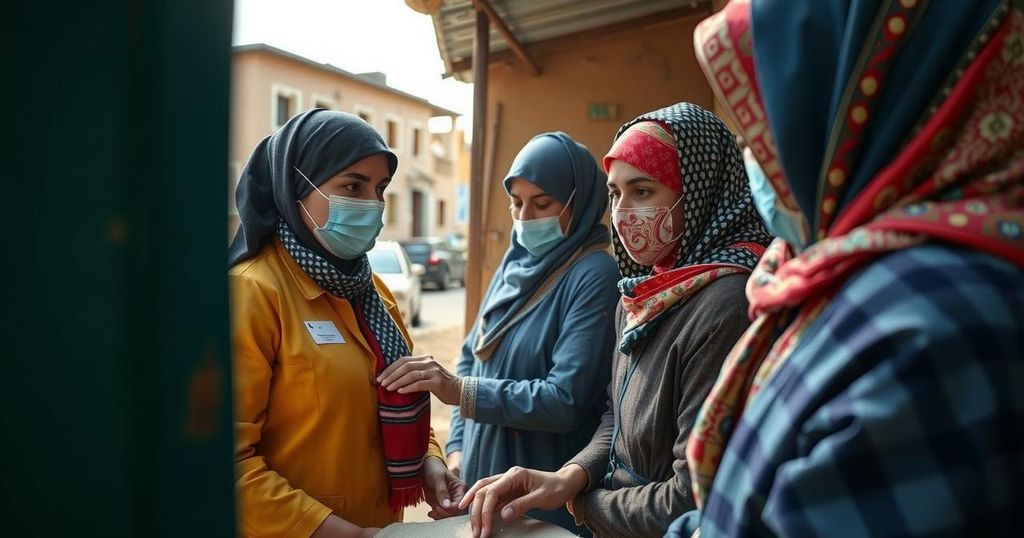Midwives Providing Essential Support to Earthquake-Affected Communities in Morocco

In September 2023, Morocco faced a devastating 6.8 magnitude earthquake, leading to over 2900 fatalities and impacting pregnant women significantly. The Association Marocaine des Sages-Femmes (AMSF), in partnership with the International Confederation of Midwives (ICM) and funded by Direct Relief, provided essential healthcare through mobile clinics in severely affected areas. They offered medical and psychological support, emphasizing the role of midwives in recovery efforts. Looking ahead, AMSF and ICM are preparing for future emergencies by enhancing training for midwives.
In September 2023, Morocco experienced a catastrophic earthquake with a magnitude of 6.8, resulting in significant destruction, particularly affecting rural communities in the Atlas Mountains. This tragedy claimed over 2900 lives and left more than 5500 individuals injured. Among those severely impacted were pregnant women, who faced not only the loss of their homes and loved ones but also exacerbated health dangers amid the ensuing chaos. In response to this disaster, the Association Marocaine des Sages-Femmes (AMSF), with support from the International Confederation of Midwives (ICM), mobilized efforts to deliver essential healthcare services. With funding from Direct Relief, AMSF deployed five medical caravans across various affected regions, including Saidate, Tighdouine, Zerkten, Onein, and Timzdagiouine, in addition to a sixth caravan that reached Ouirgane in the Province of Al Haouz—an area that required urgent assistance. On January 13, 2024, the AMSF midwives, in collaboration with a multidisciplinary team comprising physicians and nurses, established a mobile clinic in Ouirgane. In this single-day initiative, they treated 169 patients, providing services such as prenatal care, medical consultations, and screenings for conditions including HIV, diabetes, and hypertension. They also performed ultrasounds to monitor fetal health and conducted educational workshops focused on family planning, nutrition, and breastfeeding. Furthermore, the team distributed 140 dignity kits, 10 newborn kits, and winter apparel to families impacted by the earthquake. For individuals needing advanced medical care, the midwives coordinated referrals to higher-level health facilities like Marrakech University Hospital, thereby ensuring continuity of care. The midwives’ efforts extended beyond medical support; they also offered psychological assistance to women grappling with trauma and loss. Individual and group sessions were conducted to aid those affected by gender-based violence, highlighting the compassionate and multifaceted role midwives undertake in their communities. Accessing these remote and devastated areas posed significant challenges, yet the AMSF midwives, leveraging their strong ties within local networks, persevered to reach those in dire need. As Morocco begins its recovery process, AMSF and ICM are proactively preparing for future crises. AMSF has advocated for further training for their members, leading ICM to develop the “Ready to Respond: A Midwife’s Guide to Humanitarian Action” program. This extensive training aims to empower midwives to respond decisively and competently in emergencies, covering critical aspects like disaster management and respectful maternity care in humanitarian contexts. In May 2024, ICM facilitated a three-day Train the Trainer (ToT) program in Rabat, equipping AMSF midwives with skills to assess needs during crises, manage newborn care during emergencies, and advocate for midwifery inclusion in national emergency response plans. This training will enable midwives to safeguard the health of their communities and promote the integration of midwives in future disaster preparedness. The collaborative efforts of Direct Relief, ICM, and AMSF exemplify how midwives can assume leadership roles in times of crisis. As the earthquake-affected communities gradually recover, the unwavering commitment of these midwives provides not only vital medical care but also hope and stability.
In September 2023, a destructive earthquake struck Morocco, particularly harming rural communities in the Atlas Mountains. The earthquake caused immense loss of life and widespread injury, particularly impacting vulnerable populations such as pregnant women. The response to this disaster highlighted the critical role of midwives in providing healthcare and emotional support in times of crisis, as well as the importance of preparedness for future emergencies.
The response by AMSF midwives in the aftermath of the earthquake demonstrates the vital role of midwives in crisis situations. Their ability to deliver medical services, provide psychological support, and advocate for community needs fosters resilience and stability in affected populations. As anticipation builds for future disasters, training initiatives such as the ‘Ready to Respond’ program will ensure midwives are equipped to handle emergencies effectively, thus reinforcing the healthcare system in Morocco and enhancing the well-being of communities in peril.
Original Source: internationalmidwives.org






